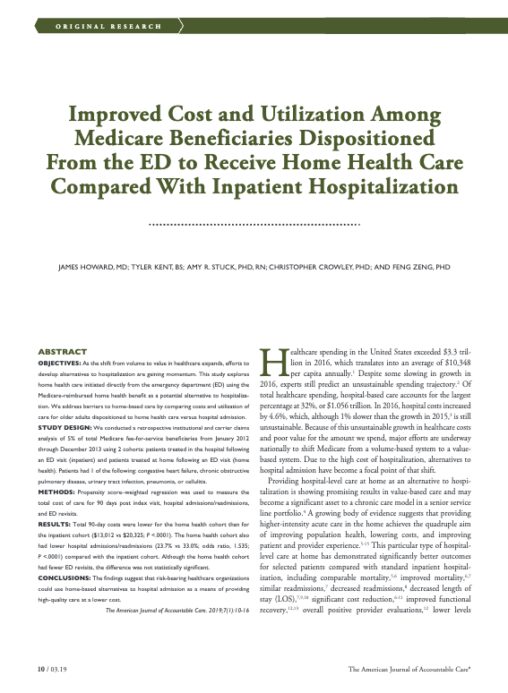Improved Cost and Utilization Among Medicare Beneficiaries Dispositioned From the ED to Receive Home Health Care Compared With Inpatient Hospitalization
James Howard, MD; Tyler Kent, BS; Amy R. Stuck, PhD, RN; Christopher Crowley, PhD; and Feng Zeng, PhD
ABSTRACT
Objectives: As the shift from volume to value in healthcare expands, efforts to develop alternatives to hospitalization are gaining momentum. This study explores home healthcare initiated directly from the emergency department (ED) using the Medicare-reimbursed home health benefit as a potential alternative to hospitalization. We address barriers to home-based care by comparing costs and utilization of care for older adults dispositioned to home healthcare versus hospital admission.
Study Design: We conducted a retrospective institutional and carrier claims analysis of 5% of total Medicare fee-for-service beneficiaries from January 2012 through December 2013 using 2 cohorts: patients treated in the hospital following an ED visit (inpatient) and patients treated at home following an ED visit (home health). Patients had 1 of the following: congestive heart failure, chronic obstructive pulmonary disease, urinary tract infection, pneumonia, or cellulitis.
Methods: Propensity score–weighted regression was used to measure the total cost of care for 90 days post index visit, hospital admissions/readmissions, and ED revisits.
Results: Total 90-day costs were lower for the home health cohort than for the inpatient cohort ($13,012 vs $20,325; P <.0001). The home health cohort also had lower hospital admissions/readmissions (23.7% vs 33.0%; odds ratio, 1.535; P <.0001) compared with the inpatient cohort. Although the home health cohort had fewer ED revisits, the difference was not statistically significant.
Conclusions: The findings suggest that risk-bearing healthcare organizations could use home-based alternatives to hospital admission as a means of providing high-quality care at a lower cost.





